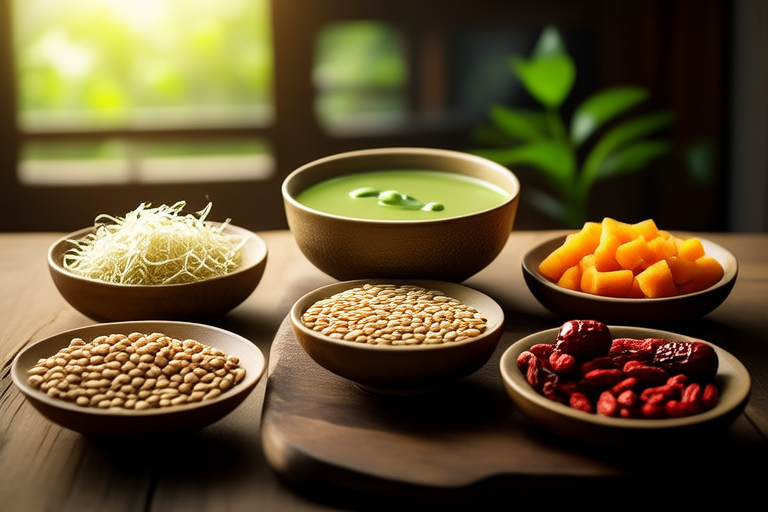Seasonal Health Preservation: Tailoring Your Wellbeing to Each Season
The natural world around us is constantly changing with the passage of time, and these changes have a profound impact on our health and wellbeing. To maintain optimal health, it is essential to adapt our health preservation methods according to the season we are in. This article will provide an overview of how you can tailor your health preservation methods to each of the four seasons: Spring, Summer, Autumn, and Winter. By following the tips provided, you can ensure that you are doing everything possible to stay healthy and vibrant all year round.
Spring: A Time of Renewal and Growth
Spring is a time of renewal and growth, both in nature and within ourselves. As the weather warms up and the days lengthen, it’s important to adapt your health preservation methods to align with this change. Here are some tips for maintaining your health during spring:
Dietary Recommendations
During spring, it’s essential to focus on fresh, light foods that support the body’s natural detoxification process. Incorporate plenty of leafy greens, sprouts, and other fresh vegetables into your diet. These foods are rich in vitamins, minerals, and antioxidants, which help to nourish the liver and support its function. Additionally, consider incorporating more sour foods, such as lemons and limes, into your meals. Sour foods are believed to stimulate the liver and promote digestion.
Exercise Advice
Incorporating regular exercise into your routine is crucial during spring. The warmer weather makes it easier to get outside and enjoy physical activity. Consider activities like walking, jogging, cycling, or yoga, which are gentle on the joints but still provide a good cardiovascular workout. These activities also help to improve circulation, which is important for detoxification. Additionally, spring is a great time to start strength training, as the increased daylight hours can boost energy levels and make it easier to build muscle.
Lifestyle Changes
As the days grow longer and the weather warms up, it’s important to adjust your sleep schedule accordingly. Try to go to bed earlier and wake up earlier to take advantage of the extra daylight. This can help regulate your internal clock and improve the quality of your sleep. Additionally, spend time outdoors whenever possible. Being in nature can help reduce stress and improve mood, which is particularly important after the long winter months.
Summer: Embrace the Heat and Stay Cool
Summer is a time to embrace the heat and stay cool. With temperatures rising and the sun shining brighter, it’s important to adapt your health preservation methods to the summer season. Here are some tips for maintaining your health during summer:
Dietary Recommendations
During summer, it’s important to focus on cooling foods that help to regulate body temperature and prevent dehydration. Incorporate plenty of fruits and vegetables into your diet, especially those that are hydrating and refreshing, such as watermelon, cucumber, and strawberries. Additionally, consider reducing your intake of heavy, greasy foods, which can be harder to digest in the heat. Instead, opt for lighter meals that are easy to digest and won’t leave you feeling sluggish.
Exercise Advice
Regular exercise is important during summer, but it’s important to be mindful of the heat. Exercise early in the morning or later in the evening when temperatures are cooler. If you’re exercising outdoors, wear lightweight, breathable clothing and apply sunscreen to protect your skin from harmful UV rays. Additionally, stay hydrated by drinking plenty of water before, during, and after exercise. This will help to prevent dehydration and keep your body functioning at its best.
Lifestyle Changes
During summer, it’s important to find ways to stay cool and comfortable. Spend time in air-conditioned spaces when possible, and avoid prolonged exposure to direct sunlight. If you’re spending time outdoors, seek shade and wear a wide-brimmed hat and sunglasses to protect yourself from the sun. Additionally, take breaks from physical activity when necessary to avoid overheating. This can help you stay cool and comfortable throughout the summer months.
Autumn: Preparing for the Cold Months Ahead
Autumn is a time of transition, as the weather cools down and the leaves change color. It’s important to prepare your body for the colder months ahead by adapting your health preservation methods to the autumn season. Here are some tips for maintaining your health during autumn:
Dietary Recommendations
During autumn, it’s important to focus on warming foods that help to regulate body temperature and promote digestion. Incorporate plenty of root vegetables, such as carrots, sweet potatoes, and onions, into your diet. These foods are rich in nutrients and help to support the digestive system. Additionally, consider incorporating more soups and stews into your meals. These dishes are comforting and nourishing, and they help to keep the body warm during cooler weather.
Exercise Advice
Regular exercise is important during autumn, but it’s important to adjust your routine to accommodate the cooler weather. Consider indoor activities like swimming, cycling, or weightlifting, which can be done in a climate-controlled environment. Additionally, outdoor activities like hiking or running can be enjoyed on cooler days. These activities help to improve cardiovascular health and strengthen muscles, which is important for maintaining mobility as you age.
Lifestyle Changes
As the weather cools down, it’s important to adjust your sleep schedule to ensure you’re getting enough rest. Try to go to bed earlier and wake up earlier to take advantage of the shorter days. This can help regulate your internal clock and improve the quality of your sleep. Additionally, take steps to protect yourself from colds and flu by washing your hands frequently and avoiding close contact with people who are sick. This can help you stay healthy and vibrant throughout the autumn months.
Winter: Staying Warm and Cozy
Winter is a time to stay warm and cozy. With temperatures dropping and the days growing shorter, it’s important to adapt your health preservation methods to the winter season. Here are some tips for maintaining your health during winter:
Dietary Recommendations
During winter, it’s important to focus on warming foods that help to regulate body temperature and promote circulation. Incorporate plenty of hearty soups and stews into your diet, as these dishes are comforting and nourishing. Additionally, consider incorporating more warming spices, such as cinnamon, ginger, and nutmeg, into your meals. These spices are believed to help improve circulation and promote digestion.
Exercise Advice
Regular exercise is important during winter, but it’s important to be mindful of the cold weather. Exercise indoors when possible, or bundle up warmly if you’re exercising outdoors. Consider activities like snowshoeing, cross-country skiing, or ice skating, which are fun and engaging ways to stay active during the winter months. Additionally, staying active can help improve circulation and keep your body warm.
Lifestyle Changes
As the weather grows colder, it’s important to take steps to stay warm and comfortable. Dress in layers to trap heat and protect yourself from the elements. Additionally, take steps to keep your home warm and cozy by using space heaters, blankets, and hot water bottles. Finally, take care of your mental health by staying connected with friends and family, and engaging in activities that bring you joy and fulfillment.










